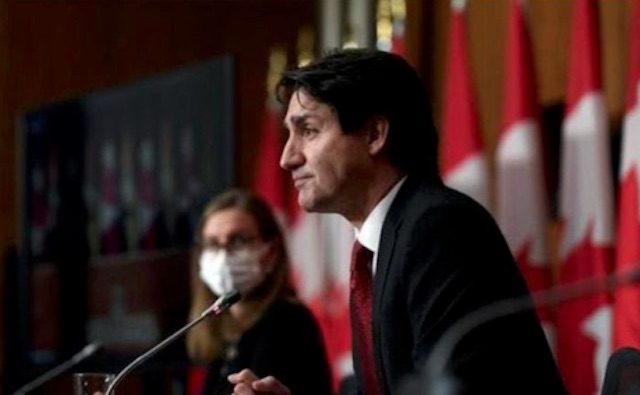Mental Health
Mental Health, MAID, and Governance in Trudeau’s Canada

|
|
The Opposition with Dan Knight
A Critical Examination of Governance, Ethical Implications, and the Search for Compassionate Solutions in a Nation in Crisis
The mental health crisis in Canada, deepened and exacerbated under Prime Minister Justin Trudeau’s leadership, has laid bare the stark realities and the fundamental cracks in our national mental health support structures. The haunting statistics released by the Angus Reid Institute have catapulted this crisis to the forefront of national discourse, but it seems that the ramifications extend far beyond mere numbers. Approximately 80% of Canadians are grappling with the inadequate availability of mental health resources, and the governmental response, or lack thereof, has amplified this concern.
Under Trudeau’s regime, the pervasive decline in mental health has not only been met with superficial commitments but has also seen the advancement of policies that many argue are an affront to the sanctity of life and individual liberty, namely, the Medical Assistance in Dying (MAID) legislation.
The Trudeau administration, amidst the throes of a profound mental health crisis, had pledged a seemingly substantial $4.5 billion over five years to address mental health care during the 2021 federal election. However, the tangible execution of this commitment remains elusive, with the funds ostensibly being absorbed into broader health care allocations. A dire need, once seemingly acknowledged, now seemingly diluted in priorities.
It’s in this same disconcerting timeframe that the contentious discussions around MAID have intensified. The proposed legislative modifications seek to expand the eligibility criteria to include individuals whose sole medical condition is a mental illness. This proposition has resulted in a fierce national debate and has amplified concerns over the values and the ethical compass guiding our nation’s leadership.
While the inception of MAID in 2016 found support among 64% of Canadians, the broadening of its scope to include mental illnesses has sparked widespread hesitation and reflection on its ethical implications. A mere 28% of Canadians support allowing those with only a mental illness to seek MAID. This shift in public sentiment is indicative of a collective realization of the complex moral, ethical, and societal implications of such a policy in a nation already strained by a lack of mental health support.
There’s an unsettling correlation between the difficulties in accessing mental health care and the support for the expansion of MAID. Two in five Canadians who’ve encountered barriers in accessing mental health care express support for the inclusion of mental illnesses in MAID eligibility. This correlation rings alarm bells about the level of desperation and despair fueled by inadequate mental health resources and support.
The MAID legislation, particularly its proposed expansion, is symptomatic of a deeper, more entrenched disregard for life and liberty. The policies and legislation emanating from Trudeau’s administration seem to foster an environment where the value of life is underplayed, and individual freedoms are undervalued. Rather than addressing the root causes and formulating holistic, compassionate solutions for mental health struggles, the government seems poised to offer an expedited escape route, overlooking the sanctity of life and the intrinsic rights of the individuals.
The urgency to address mental health challenges, especially those disproportionately affecting women, young adults, and lower-income households, is paramount. It requires genuine, sustained commitments and actions, far removed from mere electoral promises and rhetoric. The dialogue surrounding MAID, although crucial, risks overshadowing the fundamental issues at hand – the acute need for enhanced, accessible mental health care resources and a governmental ethos that values and preserves life and liberty.
In light of these pivotal concerns, this beckons a grave question to us all: Is this truly the Canada we desire? A Canada where, when faced with life’s vicissitudes, the solution provided by the government is simply to opt for MAID? Or do we yearn for a Canada that embodies hope, a belief that circumstances can, and will, improve? When 2025 arrives, the bell will indeed toll for Justin Trudeau and his Liberal compatriots, and we, as staunch Canadians, will need to rise to the occasion and answer this question. It’s a query not merely about policies or governance but about the very soul and essence of our great nation.
Subscribe to The Opposition with Dan Knight
I’m an independent Canadian journalist exposing corruption, delivering unfiltered truths and untold stories. Join me on Substack for fearless reporting that goes beyond headlines
armed forces
Why Do Some Armed Forces Suffer More Suicides Than Others?

Any single suicide is an unspeakable tragedy. But public health officials should be especially alarmed when the numbers of suicides among a particular population spike. Between 2019 and 2023, the suicide rate across Canada fell from 12.3 per 100,000 to 9.5 per 100,000. U.S. numbers aren’t that different (although they’re heading in the other direction).
Holding public officials and institutions accountable using data-driven investigative journalism.
Against this context, the suicide rate among active Canadian military personnel is truly alarming. Data included in a 2021 Report on Suicide Mortality in the Canadian Armed Forces (CAF) showed that the three year moving average annual rate for suicides in all services of the CAF was 23.38 per 100,000 – around twice the national rate. Which, of course, is not to ignore the equally shocking suicide rates among military veterans.
This isn’t specific to Canada. All modern military communities have to worry about numbers like those. Officials in the Israel Defense Force – now hopefully emerging from their longest and, by some measures, costliest war ever – are struggling to address their own suicide crisis. But there’s a significant difference that’s probably worth exploring.
Through 2024, 21 active duty IDF soldiers took their own lives. This dark number has justifiably inspired a great deal of soul searching and, naturally (it being Israel), finger pointing. But the real surprise here is how low that number is.
It’s reasonable to estimate that there were 170,000 active duty soldiers in the IDF during 2024 and another 300,000 active reservists. If you count all of those together, the actual suicide rate is just 4.5 per 100,000 – which is less than half of the typical civilian suicide rate in Western countries!
Tragic. But hardly an epidemic. Those soldiers have all lost friends and faced battlefield conditions that I, for one, find impossible to even comprehend. And those 300,000 reservists? They’ve been torn away from their families, businesses, and normal lives for many months. Many have suffered devastating financial, social, and marital pressures. And still: we’re losing them at lower rates than most civilian populations!
Is there any lesson here that could help inform CAF policy?
One obvious difference is sense of purpose: IDF members are fighting for the very existence of their people. They all saw and felt the horrors of the October 7 massacres and know that there are countless thousands of adversaries who would be happy do it again in a heartbeat¹. And having a general population that overwhelmingly supports their mission can only help that sense.
But there are some other factors that could be worth noting:
- The IDF is unusual in that it subjects all potential conscripts to mandatory psychological screening – resulting in many exemptions.
- Small, stable units are intentionally kept together for years. In fact, units are often formed from groups who have known each other since their early school years. This cohesion also helps with post-service integration.
- Every IDF battalion has a dedicated officer trained in brief interventions and utilization rates are high.
Is there anything here that CAF officials could learn from?
Health
Colorado gave over 500 people assisted suicide drugs solely for eating disorders in 2024

Fr0m LifeSiteNews
The lawsuit says Colorado’s assisted suicide law violates federal protections by allowing physicians to prescribe lethal drugs to some disabled patients under circumstances where others would be directed to mental health care
Doctors in Colorado are pushing assisted suicide on hundreds of patients solely because they suffer from eating disorders, according to a patients’ advocate sharing the harrowing story of one such case.
Writing in the Denver Post, Patient Rights Action Fund and Institute for Patient Rights executive director Matt Vallière tells the story of his friend Jane Allen, who battled anorexia “most of her life,” who in 2018 was diagnosed with “terminal anorexia,” a relatively recent diagnosis which has been criticized as overly broad and dangerous.
Her eating disorder doctor, Jane wrote, “would ‘make an exception’ for me and ‘allow’ me to die, if that was my choice. It didn’t feel like my choice – I felt coerced and spent an incredibly agonizing months in an assisted living facility.” She eventually received the suicide drugs, but was saved by her father winning a guardianship order and having the drugs destroyed.
“I ate just enough to not die right away. And then I ate more,” Jane wrote. “I weaned off the morphine and all the other hospice drugs that kept me in such a fog. I was getting better, and then I was told that I was too much of a liability and dropped from the clinic. I moved from Colorado to Oregon. I have a job that I love, a new puppy, and a great group of friends. I’m able to fuel my body to hike and do the things I love. I’m repairing my relationship with my family, and I have a great therapist who is helping me process all of this. Things obviously aren’t perfect, and I still have hard days. But I also have balance, and flexibility, and a life that is so much more than I was told would ever be possible for me.”
Jane ultimately passed away due to complications from her years of anorexia, which Vallière wonders could have been prevented by not detouring her down the terminal anorexia route. Regardless, her story details how easily similar cases can end in suicide for people without people willing to fight to give them hope. Live Action notes that last year, Colorado saw a record number of people, 510, prescribed suicide drugs solely for dietary disorders.
“What we do know is that these laws are not so rosy as the propaganda would have you believe,” Vallière writes, adding “there has been and will be more collateral damage in people like Jane or Coloradan Mary Gossman, who was told by a nationally renowned Denver eating disorder treatment facility, ‘there’s nothing we can do for you,’ which qualified her for lethal drugs under the law. She’s in a better place now and has joined as a plaintiff in a lawsuit to overturn the law. So, I ask: how many collateral deaths are acceptable to you?”
That lawsuit says that Colorado’s so-called “medical aid-in-dying” or assisted suicide law violates federal protections by allowing physicians to prescribe lethal drugs to some disabled patients under circumstances where others would be directed to mental health care, by “assum[ing] that a request for assisted suicide is not an indication of a mental disorder, when other Colorado laws make precisely the opposite assumption for virtually everyone else.”
Twelve U.S. states plus the District of Columbia allow assisted suicide. In April, however, a bill to legalize euthanasia failed in Maryland.
As Vallière has previously argued elsewhere, current euthanasia programs in the United States constitute discrimination against patients with life-threatening conditions in violation of the Americans with Disabilities Act, as when a state will “will pay for every instance of assisted suicide” but not palliative care, “I don’t call that autonomy, I call that eugenics.”
Live Action’s Bridget Sielicki further notes that “because a paralytic is involved, a person can look peaceful, while they actually drown to death in their own bodily secretions. Experimental assisted suicide drugs have led to the ‘burning of patients’ mouths and throats, causing some to scream in pain.’ Furthermore, a study in the medical journal Anaesthesia found that a third of patients took up to 30 hours to die after ingesting assisted suicide drugs, while four percent took seven days to die.”
Support is available to talk to those struggling with thoughts of ending their lives. The Suicide & Crisis Lifeline can be reached by calling or texting 988.
-

 armed forces11 hours ago
armed forces11 hours agoIt’s time for Canada to remember, the heroes of Kapyong
-

 International2 days ago
International2 days agoBBC uses ‘neutrality’ excuse to rebuke newscaster who objected to gender ideology
-

 Agriculture2 days ago
Agriculture2 days agoThe Canadian Food Inspection Agency’s Bloodlust for Ostriches: Part 2
-

 Housing2 days ago
Housing2 days agoTrump advancing 50-year mortgage to help more Americans buy homes
-

 Agriculture2 days ago
Agriculture2 days agoWas The Ostrich “Cull” A Criminal Act?
-

 International2 days ago
International2 days agoBBC boss quits amid scandal over edited Trump footage
-

 Frontier Centre for Public Policy2 days ago
Frontier Centre for Public Policy2 days agoNotwithstanding Clause Is Democracy’s Last Line Of Defence
-

 Daily Caller2 days ago
Daily Caller2 days agoMcKinsey outlook for 2025 sharply adjusts prior projections, predicting fossil fuels will dominate well after 2050










